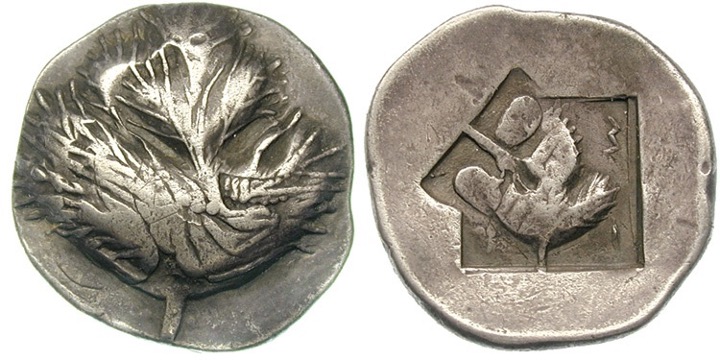2268 - Selinus (didrachm leaf/incuse square) over Corinth (Pegasus/swastika) (Freeman & Sear, MBS 15, June 2008, 29)
From SILVER
515 BCE - 470 BCE | ΣΕΛI
Images
Overstriking coin

SO_169_-_Selinus_(didrachm_leaf-incuse_square).jpg [1]
Location/history
| Sale(s)Sale(s) ᵖ: | Freeman & Sear, MBS 15, 27 June 2008, 29 ; Seaby, 1970. | |
| Private collection(s)Private collection(s) ᵖ: | A. M. Potts collection |
Overstriking coin
Description
| ObverseInscription or printing placed on the obverse.: | Selinon leaf. | ReverseInscription or printing placed on the reverse.: | ΣΕΛI (Greek) Incuse square containing selinon leaf. |
Mint and issuing power
| MintIdentifies the place of manufacture or issue of a numismatic object.: | Selinus | Ancient regionAncient region. | Sicily | Modern countryModern country: Italy | AuthorityIdentifies the issuing power. The authority can be "pretended" when the name or the portrait of X is on the coin but he/she was not the issuing power. It can also be "uncertain" when there is no mention of X on the coin but he/she was the issuing power according to the historical sources: |
Chronology
| FromIdentifies the initial date in a range assigned in a numismatic context. 515 BCE toIdentifies the final date in a range assigned in a numismatic context.. 470 BCE | Archaic until 480 BC |
Physical description
| MetalThe physical material (usually metal) from which an object is made.: Silver |
WeightWeight of the numismatic object (in grams). in grams: 8.528.52 g <br />8,520 mg <br /> | DenominationTerm indicating the value of a numismatic object. Examples: tetradrachm, chalkous, denarius.: didrachm |
|
| StandardStandard.: Corinthian | |||
References
| Coin referenceReference of the Coin: | Coin series referenceReference to coin series study: | SNG ANS 4 Sicily1SNG ANS 4 Sicily, n° 685., Arnold-Biucchi 19922Arnold-Biucchi 1992, p. 17, n° 12, HGC 23HGC 2, n° 1216 | |
| Coin series web referenceCoin series web references: | |||
Overstruck type
Description
| ObverseInscription or printing placed on the obverse.: | Pegasus | ReverseInscription or printing placed on the reverse.: | Swastika. |
Mint and issuing power
| MintIdentifies the place of manufacture or issue of a numismatic object. ᵖ: | Corinth | Ancient regionAncient region. ᵖ | Peloponnesus | Modern countryModern country: Greece | AuthorityIdentifies the authority in whose name (explicitly or implicitly) a numismatic object was issued. ᵖ: |
Chronology
| FromIdentifies the initial date in a range assigned in a numismatic context. 530 BCE toIdentifies the final date in a range assigned in a numismatic context.. 470 BCE | Archaic until 480 BC |
Physical description
| DenominationTerm indicating the value of a numismatic object. Examples: tetradrachm, chalkous, denarius. ᵖ: | didrachm |
References
| Coin type referenceReference to coin series study ᵖ: |
Additional data
| Frequency of overstrikesFrequency of overstrikes: | rare and spread | Level of confidenceLevel of confidence of the identification: | sure |
| RemarksRemarks: | "Overstruck on a stater of Corinth: Pegasus’ wing partially visible on obverse, part of swastika incuse visible on reverse" | ||
References
- ^ Sylloge Nummorum Graecorum ANS 4. The Collection of the American Numismatic Society. Sicily 2 (Galaria - Styella), New York, 1977, 25 pl.
- ^ Arnold-Biucchi, Carmen (1992), "The beginnings of coinage in the West. Archaic Selinus.", in: Nilsson, Harald (ed), Florilegium numismaticum : studia in honorem U. Westermark edita, Stockholm, Svenska Numismatiska Föreningen, p. 13-19.
- ^ Hoover, Oliver D. (2012), The Handbook of Greek Coinage Series. 2. Handbook of the Coins of Sicily (Including Lipara). Civic, Royal, Siculo-Punic, and Romano-Sicilian Issues. Sixth to First Centuries BC, Lancaster-London, 489 p.
